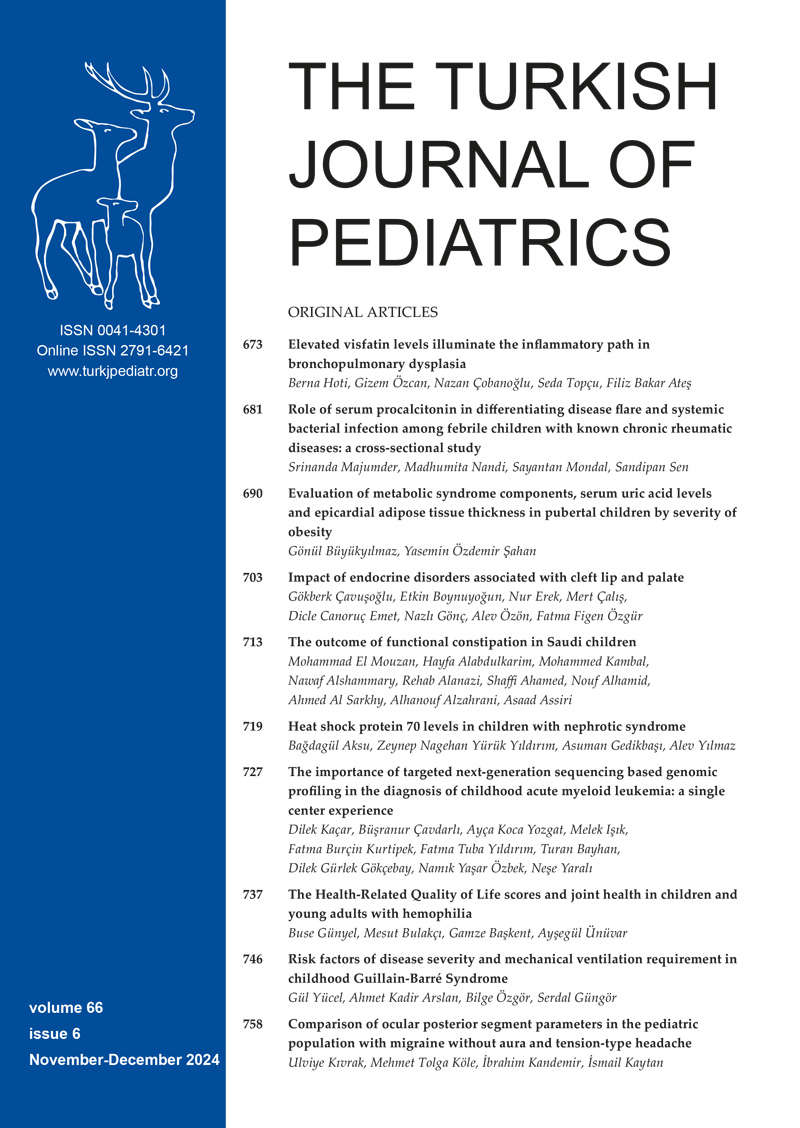Abstract
Background. Understanding the outcome of functional constipation (FC) for both patients and physicians is essential, yet it has been infrequently reported worldwide. The objective of this report was to update the outcomes of FC in Saudi children.
Methods. Clinical data including age, sex, response to management, duration of follow up, and type of management were collected from the notes of each clinic visits and phone call follow-ups.
Results. The study included 268 children followed up for a 7 year duration. The median age of onset was 4 (0.1 to 13) years, and 123/268 (46%) were male. There was an increasing recovery rate with increasing duration of follow up with an overall recovery rate of 79%. There was no significant association between recovery and age at onset (p=0.0860) or duration of constipation (P=0.124). Management by pediatric gastroenterologists did not increase rate of recovery (81% vs. 77%, p=0.432) or being cured (47% vs. 36%, p=0.108) significantly. According to the parents of children who recovered, diet in association with polyethylene glycol (PEG) and toilet training were most helpful. Poor diet and nonadherence to medications were the most common causes of lack of recovery.
Conclusions. The higher rates of recovery in this Middle Eastern childhood population than other populations are possibly related to cultural characteristics. The parents’ views support the importance of diet associated with other modalities as important parts of management. Further research is needed to identify correctable causes of nonadherence to treatment to improve recovery.
Keywords: chronic constipation, prognosis, Saudi children
References
- Rome Foundation. Rome IV Criteria. Available at: https://theromefoundation.org/rome-iv/rome-iv-criteria (Accessed on November 11, 2023).
- Drossman DA. Functional gastrointestinal disorders: history, pathophysiology, clinical features, and Rome IV. Gastroenterology 2016; 150: 1262-1279.e2. https://doi.org/10.1053/j.gastro.2016.02.032
- Fedele F, Fioretti MT, Scarpato E, Martinelli M, Strisciuglio C, Miele E. The ten “hard” questions in pediatric functional constipation. Ital J Pediatr 2024; 50: 64. https://doi.org/10.1186/s13052-024-01623-y
- Cenni S, Pensabene L, Dolce P, et al. Prevalence of functional gastrointestinal disorders in Italian children living in different regions: analysis of the difference and the role of diet. Dig Liver Dis 2023; 55: 1640-1646. https://doi.org/10.1016/j.dld.2023.05.013
- Levy EI, Lemmens R, Vandenplas Y, Devreker T. Functional constipation in children: challenges and solutions. Pediatric Health Med Ther 2017; 8: 19-27. https://doi.org/10.2147/PHMT.S110940
- Khatib MA, Aljaaly EA. Testing the Arabic-Saudi Arabia version of the Rome IV Diagnostic Questionnaire for functional gastrointestinal disorders for children living in Saudi Arabia. Front Pediatr 2023; 10: 1055513. https://doi.org/10.3389/fped.2022.1055513
- Hasosah M, Alsahafi A, Alghraibi A. Prevalence, characterization, and risk factors of chronic constipation among Saudi children: a cross-sectional study. Int J Adv Res 2018; 6: 1319-1324. https://doi.org/10.21474/IJAR01/6986
- Hasosah M, Al Sarkhy A, AlQuiar K, et al. Prevalence of functional gastrointestinal disorders in Saudi infants and toddlers: a cross-sectional multicenter study. Saudi J Gastroenterol 2024; 30: 145-153. https://doi.org/10.4103/sjg.sjg_259_23
- Tabbers MM, DiLorenzo C, Berger MY, et al; European Society for Pediatric Gastroenterology, Hepatology, and Nutrition; North American Society for Pediatric Gastroenterology. Evaluation and treatment of functional constipation in infants and children: evidence-based recommendations from ESPGHAN and NASPGHAN. J Pediatr Gastroenterol Nutr 2014; 58: 258-274. https://doi.org/10.1097/MPG.0000000000000266
- Hasosah M, Telmesani A, Al-Binali A, et al. Knowledge and practice styles of pediatricians in Saudi Arabia regarding childhood constipation. J Pediatr Gastroenterol Nutr 2013; 57: 85-92. https://doi.org/10.1097/MPG.0b013e318291e304
- El Mouzan M, Kambal M, Alabdulkarim H, et al. Clinical profile of functional constipation in Saudi children. Ann Saudi Med 2024; 44: 111-115. https://doi.org/10.5144/0256-4947.2024.111
- Pijpers MA, Bongers ME, Benninga MA, Berger MY. Functional constipation in children: a systematic review on prognosis and predictive factors. J Pediatr Gastroenterol Nutr 2010; 50: 256-268. https://doi.org/10.1097/MPG.0b013e3181afcdc3
- IBM SPSS Statistics for Windows, Version 26.0. Armonk, NY, USA: IBM Corp.
- Loening-Baucke VA. Factors responsible for persistence of childhood constipation. J Pediatr Gastroenterol Nutr 1987; 6: 915-922. https://doi.org/10.1097/00005176-198711000-00016
- van den Berg MM, van Rossum CH, de Lorijn F, Reitsma JB, Di Lorenzo C, Benninga MA. Functional constipation in infants: a follow-up study. J Pediatr 2005; 147: 700-704. https://doi.org/10.1016/j.jpeds.2005.05.032
- Martínez-Costa C, Palao Ortuño MJ, Alfaro Ponce B, et al. Functional constipation: prospective study and treatment response. An Pediatr (Barc) 2005; 63: 418-425. https://doi.org/10.1157/13080407
- de Lorijn F, van Wijk MP, Reitsma JB, van Ginkel R, Taminiau JA, Benninga MA. Prognosis of constipation: clinical factors and colonic transit time. Arch Dis Child 2004; 89: 723-727. https://doi.org/10.1136/adc.2003.040220
- Elshimy N, Gallagher B, West D, Stringer MD, Puntis JW. Outcome in children under 5 years of age with constipation: a prospective follow-up study. Int J Clin Pract 2000; 54: 25-27.
- Staiano A, Andreotti MR, Greco L, Basile P, Auricchio S. Long-term follow-up of children with chronic idiopathic constipation. Dig Dis Sci 1994; 39: 561-564. https://doi.org/10.1007/BF02088343
- Michaud L, Lamblin MD, Mairesse S, Turck D, Gottrand F. Outcome of functional constipation in childhood: a 10-year follow-up study. Clin Pediatr (Phila) 2009; 48: 26-31. https://doi.org/10.1177/0009922808320599
- Chanpong A, Osatakul S. Laxative choice and treatment outcomes in childhood constipation: clinical data in a longitudinal retrospective study. Pediatr Gastroenterol Hepatol Nutr 2018; 21: 101-110. https://doi.org/10.5223/pghn.2018.21.2.101
- de Campos GRC, Sandy NS, Lomazi EA, Bellomo-Brandao MA. Management of children with functional constipation referred to tertiary care. J Pediatr (Rio J) 2022; 98: 289-295. https://doi.org/10.1016/j.jped.2021.06.006
Copyright and license
Copyright © 2024 The Author(s). This is an open access article distributed under the Creative Commons Attribution License (CC BY), which permits unrestricted use, distribution, and reproduction in any medium or format, provided the original work is properly cited.















